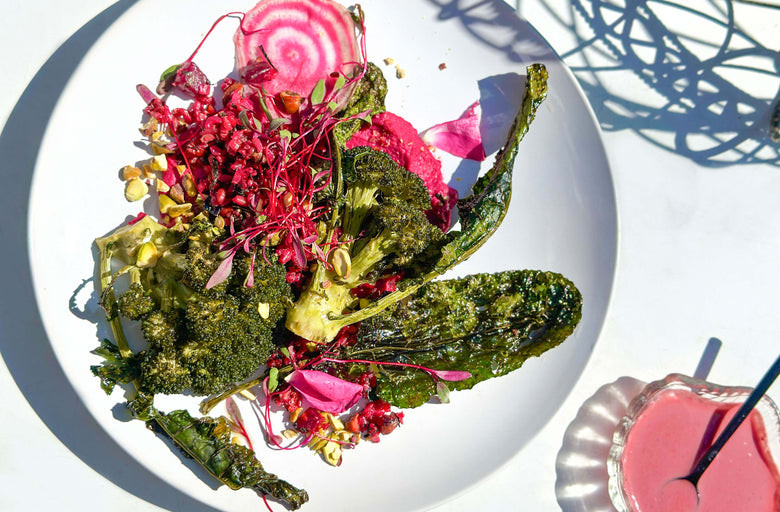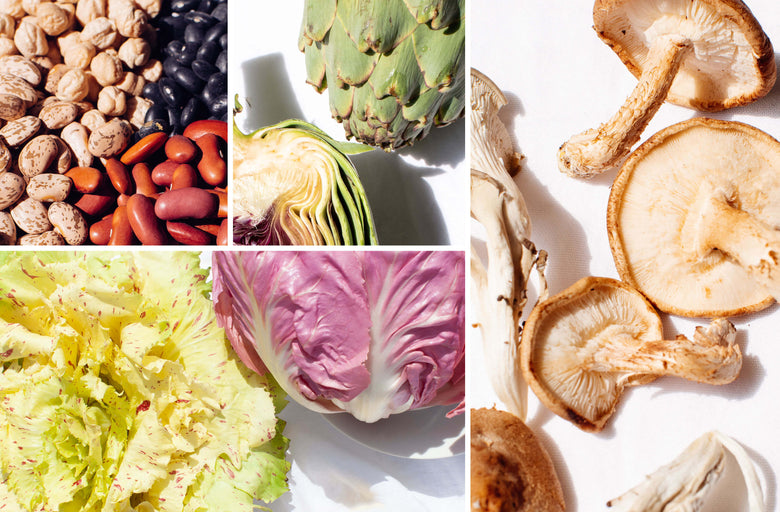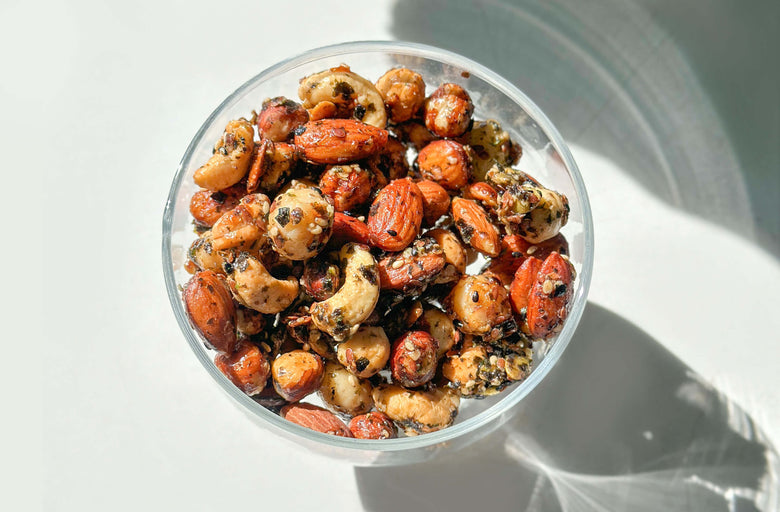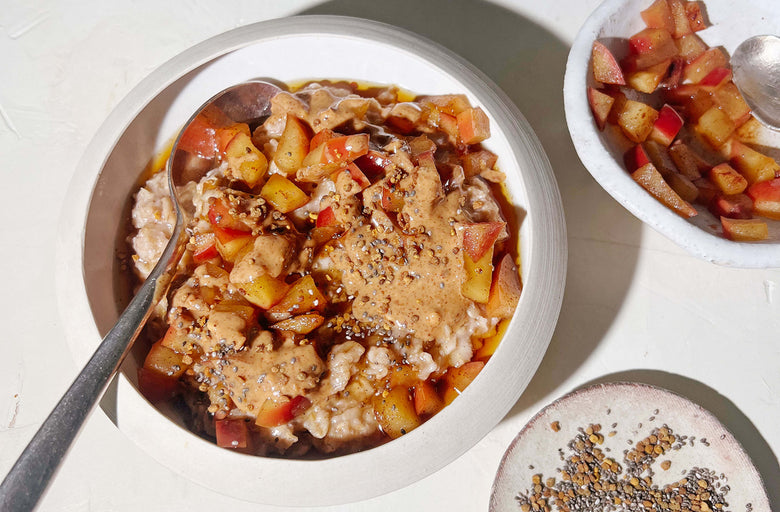“Plant-based” is the diet du jour. But while it’s touted as a panacea—promising effortless weight loss, radiant skin, and protection against a host of diseases—as a lifestyle, it’s a bit vague. Is it vegetarian? Vegan? Flexitarian? Where does paleo fit in? What about (gasp) keto? Oreos and potato chips are “plant-based”—are they allowed? What does it really mean?
To develop the proprietary food philosophy that would become the DNA of the Sakara program, our founders spent years studying the healthiest diets on the planet, delving into cutting-edge nutrition science and ancient healing modalities alike. The common theme that kept rising to the top? Eating plants. As Whitney puts it, “I don’t believe you need to only eat plants to be healthy, but I don’t believe you can be healthy without eating them.”
We get this question—“what does ‘plant-based’ mean?”—all the time, and we wanted to provide you some much-needed clarity, once and for all. So we sat down with our founders Whitney Tingle and Danielle Duboise to break down how this elusive term is defined in the Sakara universe.
Q: So first things, first, what does plant-based mean for Sakara?
Danielle: It means basing your diet on plants—eating a whole food, plant rich diet. The Sakara way is to focus on what you ARE eating instead of focusing on what not to eat. The more whole, organic and fresh plants you get into your body every day, means the more essential nutrients you’re getting like antioxidants, phytonutrients, electrolytes, vitamins, minerals, healthy fats, water, fiber, and life energy. And you need a lot of plants and a huge variety to reap all the benefits. What plant-based does not mean to us is eating vegan junk food or 75 versions of avocado toast :) It’s a celebration of abundance, a love affair with health, and our pursuit of food in the name of joy and medicine. While we nourish deeply by treating food as medicine, we also don’t have a “no” list. Nothing is off limits and there’s no “wagon” to fall off of, and that’s where we diverge from typical plant-based diets. It’s not about putting a label on yourself and creating restrictions from having what you want—instead it’s about nourishing the foundation to get enough of the information your body requires, and then living your life however you like. If you want an extra glass of wine, or to grab a slice of pizza with friends on a Saturday, that’s all good. It’s just life, which is meant to be joyful and without rules.
Q: Are there things that are restrictive in a plant-based diet?
Whitney: Living the Sakara Life is all about balance, so we fully support the occasional indulgence and recognize that it’s not just inevitable, but necessary. The Sakara nutrition philosophy changes how the body assimilates foods that aren’t healing, easing reactions and inflammation, and even affecting how the body uses non-nourishing calories. To us, plant-based is a way of getting the maximum variety. Without restrictions, we lean into eating whatever our body and soul is called to (and the mood can strike for martinis and French fries) because our baseline is diverse, rainbow-drenched plants. We don’t villainize any food, and no food is off-limits…because the truth is, the guilt that creates is more toxic than any sweet treat you crave. We aren’t extremists in any way, and instead approach food as a tool to get you to your ultimate desired outcome in life, fulfilling your purpose on this planet. To us, joy is an important nutrient and to put guardrails on how we’re supposed to enjoy life can end up making us more stressed than necessary. We don’t believe in creating barriers or unnecessary guilt. It’s all “allowed” in the Sakara lifestyle.
What you do or don’t eat does not define who you are. How you fuel your body each day enables you to live the life that DOES define who you are. One that holds space to shine as your most confident, grounded, nurturing, radiant, authentic self. And the path to authenticity is one without judgment.
Q: Is there science behind a plant-rich model?
Danielle: The Sakara nutrition protocol works because it is rooted in science, while celebrating the spirit of playing with delicious, artful ingredients. Studies show the more organic plants you eat to support your microbiome, the better your body is equipped to metabolize and handle the foods that might be on someone else’s “no” list. We focus on healing the microbiome, which is the trillions of bacteria in and on the body that dictates everything from mood to energy, sleep to sex drive, how our calories are absorbed and how various hormones work together. It’s the power center of your being, and is ever-changing; meaning you have the ability to affect your health every time you sit down to eat. By supporting the gut, your body boosts its ability to heal or reverse preventable lifestyle diseases.
Q: How has this way of eating affected you?
Danielle: It was the most transformative thing to happen to both Whitney and me, once we devised to eat this way after only a few weeks. It got us back to our roots, even in the midst of this wild city. Whitney and I both grew up in the wellness mecca of Sedona, Arizona, where we were surrounded by people who “ate” sunshine and chewed chlorella tablets for dessert. It was a place that instilled in us the sense of free-spirited curiosity, and taught us the mind/body connection… above all, eating as close to the source as possible as a way to reconnect with nature and heal through nourishment. Science is finally catching up to this inherent wisdom: we’re learning how chronic diseases can fall into remission through eating enough greens; the phytochemical lutein is critical for memory and cognition; supporting the microbiome can significantly improve your immunity and reverse signs of aging. High-quality, organic plants aid in hormone balance, weight maintenance, skin clarity, fertility, and fight depression and anxiety.
Sakara’s Tips For Adopting a Plant-Based Diet
Danielle and Whitney share their thoughts on nurturing your body and soul with food.
Choose HIGH-QUALITY ORGANIC: Organic is critical in the quest for quality because the produce maintains its nutritional integrity, meaning you get all the vitamins and minerals your ancestors did, and plenty more antioxidants to combat aging and environmental stressors. Choosing organic is the exception to our rule: paying attention to what’s not on your plate...think pesticides, GMOs, carcinogens, and the like. According to the Environmental Working Group, eating an organic diet can reduce your pesticide level by a staggering 90%. We use organic produce because it’s safer, less toxic and closer to as Mother Nature intended.
TIP: Add a handful of organic greens to each meal for a fiber-rich dose of pesticide-free chlorophyll.
Up Your DETOXIFYING FOODS: Our bodies naturally have the capacity to eliminate toxins; the liver, kidneys, lymph, and colon are the major players that support this. Of course, modern living has stressed these systems and asked them to work overtime. Rather than the age-old mindset of deprivation to achieve deeper detox, we use foods natural superpowers to create full body clean slates. The mineral sulfur, for example, is crucial in phase II liver detox, and plant fiber acts as scrub-brushes throughout the journey of your GI tract to better absorb nutrients, and get rid of the rest.
TIP: Incorporate foods from the sulfur-rich, Brassicas family throughout the week like cabbage, Brussels sprouts, and broccoli.
Flood the Body with NUTRIENT-DENSE INGREDIENTS: Your food should work for you. Providing your body with all the nutrients it requires to thrive can be overwhelming, but nature has done a lot of the heavy lifting for you...if you only tune in. Ingredients like chia seeds, tatsoi, he shou wu, kohlrabi (did we lose you?), are packed with vitamins, minerals, and antioxidants in every morsel, making them health workhorses in your diet. At every opportunity, we sprinkle (or douse) simple meals with plants that can aptly call themselves “superfoods." Plus, plants offer a unique array of compounds called phytonutrients that can’t be obtained through any other means. For plants, these phytochemicals protect them from bacteria and viruses, but they provide ample benefits when humans partake. A single orange, for example, has over 170 phytonutrients, armed with antioxidant, anti-inflammatory properties.
TIP: Play with how you can introduce new superfoods into something you’re already eating. Toss omega-3 rich hemp seeds into a salad, medicinal mushrooms into a smoothie, microgreens in a soup, etc.
Nourish your cells with LIFE-GIVING HYDRATION: The issue with processed foods is not only that they act as foreign information to the body’s system, they’re incredibly dehydrating. Sucking the water out of our systems is a sure-fire way to age it, by shrinking cells until they can no longer replicate. When we hone in on foods with high water-content, they create vitality in our bodies, and offer preventative measures to sustain our cellular life. Plus, the water that’s trapped in fresh plants is caught in a phytonutrient-rich web of vitamins, minerals, and fibers that help your body absorb more water more slowly, which means you’re more hydrated for longer periods of time! On the surface level, they keep us plump and youthful, while deep inside they hydrate our systems for ultimate homeostasis.
TIP: Summer months mean melon, cherries, stone fruits, cucumbers, and romaine, all of which are 97% water—eat with joy and abandon.






